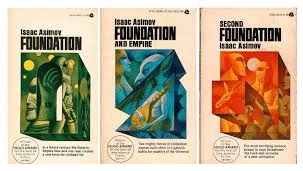Building a solid foundation in the early years of a child’s life will not only help him or her reach their full potential but will also result in better societies as a whole.
– Novak Djokovic
I’m not a starry-eyed Isaac Asimov fanboy. He had his warts. But his life mattered in the big scheme of things. I like Asimovians. To me, an Asimovian is a skeptical optimist with deep scientific, historical, and sociological erudition. Some are novices, some are students, some are teachers, and some are leaders. Others are Forrest Gump types who just stumbled into a few of the right rooms, or who read “Foundation” because it was only $1 in their rural school’s bookmobile 🙂
I clearly remember the day. It was blue-sky late spring in rural Ontario, just before the end of the school year. I stood near the front of the bookmobile, on its teetering floor, with “Foundation” in one hand, and “Foundation and Empire”, “Second Foundation”, and $2 (birthday money) in the other. Each had a sticker price of $1. “Foundation” was the thinnest, which seemed unfair, as I had no choice on #1. The arithmetic was heart-breaking. As I struggled to choose between #2 and #3, their covers alternately calling to me, the book lady said, “Those are buy two get one free.” I quickly plunked down my $2 (tax was either included or exempt, I don’t remember which) and ran from the bookmobile with the trilogy like a thief in the night.

I first read those books sitting in a tree on our farm. Tales of a course for mankind stretching into the almost unimaginably distant future. A future where science, rationalism, and humanism hold dominion. The galaxy in decline, yet enlightenment rekindled. A tiny spark of hope that grows into a vast, new, near utopia.
I read them several times over my youth and young adulthood. Hidden behind text books, in waiting rooms, while camping, wherever. Like Psychohistory itself, it wasn’t just a story, it was a guide, a ‘Plan’. Several attempts have been made at bringing the Foundation Trilogy to the screen, both large and small. They failed simply because it’s too big a story to be captured on film. It only truly lives in the imagination of the reader. Perhaps someone with enough time, money, and vision will succeed some day. I hope they don’t damage it.
Asimov died in 1992, the year I lived in Vancouver. He was on my mind as I had my first inkling of Geopense. Around 2000, still inspired by Asimov, I created an AI company with one main product. I avoided non-Asimov sequels to the story, and was slightly disappointed even with those penned by Asimov himself. They seemed a bit rushed and contrived. The only later book I liked and would recommend was the final one in the series, Foundation’s Triumph by David Brin. It had Hari Seldon as the central character amidst an epic search for that elusive utopia.
Over the years, I’ve often wondered if the book lady had lied about the price. I like to think she had. Asimovians are a resourceful lot. That’s one of the many reasons why they’ll win in the end, and a brighter future for humanity will dawn.
